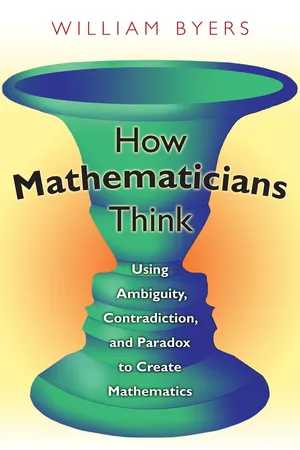
How Mathematicians Think
Using Ambiguity, Contradiction, and Paradox to Create Mathematics
William Byers
- 424 páginas
- English
- ePUB (apto para móviles)
- Disponible en iOS y Android
How Mathematicians Think
Using Ambiguity, Contradiction, and Paradox to Create Mathematics
William Byers
Información del libro
To many outsiders, mathematicians appear to think like computers, grimly grinding away with a strict formal logic and moving methodically--even algorithmically--from one black-and-white deduction to another. Yet mathematicians often describe their most important breakthroughs as creative, intuitive responses to ambiguity, contradiction, and paradox. A unique examination of this less-familiar aspect of mathematics, How Mathematicians Think reveals that mathematics is a profoundly creative activity and not just a body of formalized rules and results.
Nonlogical qualities, William Byers shows, play an essential role in mathematics. Ambiguities, contradictions, and paradoxes can arise when ideas developed in different contexts come into contact. Uncertainties and conflicts do not impede but rather spur the development of mathematics. Creativity often means bringing apparently incompatible perspectives together as complementary aspects of a new, more subtle theory. The secret of mathematics is not to be found only in its logical structure.
The creative dimensions of mathematical work have great implications for our notions of mathematical and scientific truth, and How Mathematicians Think provides a novel approach to many fundamental questions. Is mathematics objectively true? Is it discovered or invented? And is there such a thing as a "final" scientific theory?
Ultimately, How Mathematicians Think shows that the nature of mathematical thinking can teach us a great deal about the human condition itself.
Preguntas frecuentes
Información
Índice
- Cover
- Half title
- Title
- Copyright
- Contents
- Acknowledgments
- Introduction Turning on the Light
- Section I The Light of Ambiguity
- Section II The Light as Idea
- Section III The Light and the Eye of the Beholder
- Notes
- Bibliography
- Index